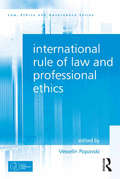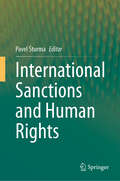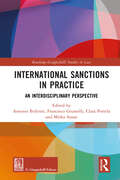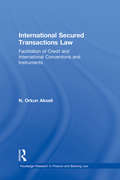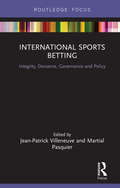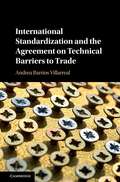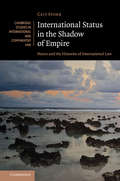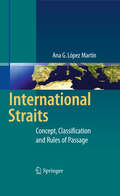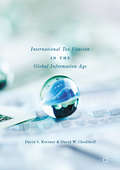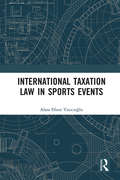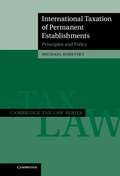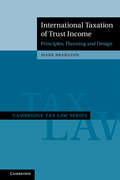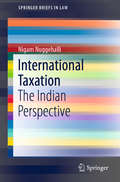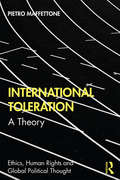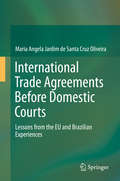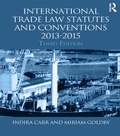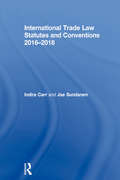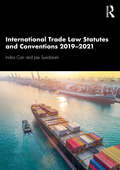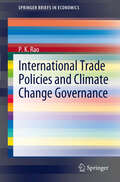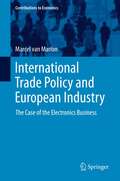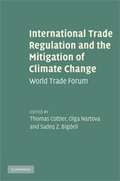- Table View
- List View
International Rule of Law and Professional Ethics (Law, Ethics And Governance Ser.)
by Vesselin PopovskiThis book examines an interesting and relatively understudied area of the evolution of the international rule of law and the role of professional ethics. The rule of law has been gradually developed and promoted at the national level over centuries, however at the international level it has only recently received (more in rhetoric than in implementation) support from a macro perspective - developments of international rules and institutions, and from a micro perspective - ethical codes, independence and un-bias of professionals, working in international organizations and tribunals. The book offers analysis and recommends policies to strengthen the rule of law at international level to meet a major global governance demand in ensuring equity, justice, stability and consistency in international affairs.
International Sales Law: A Guide To The Cisg
by Christiana Fountoulakis Ingeborg SchwenzerWritten for international trade lawyers, practitioners and students from common law and civil law countries, this casebook will help practitioners and students assimilate knowledge on the CISG. The cases, texts and questions aid readers in their comparative law and international sales law studies, drawing attention to the particular issues surrounding specific CISG provisions and provoking careful consideration of possible solutions. In addition to this book’s function as a didactical aid, it is a reference work for leading cases and an introduction to the individual problem areas. In particular, it acts as a preparatory and complementary work for the Willem C. Vis International Commercial Arbitration Moot.
International Sanctions and Human Rights
by Pavel ŠturmaThe word "sanctions" is currently used more than ever before not only in the media, political statements, but also in legal discourse. Apart from this very widely cited term, European Union documents tend to refer also to "restrictive measures" while international law parlance embraces the concept of "countermeasures" (being the modern equivalent of peaceful reprisals from the point of view of general customary international law), i.e. individual coercive measures, or "security measures", which is a term used in some treaties. Sanctions or measures, whatever they are called, are a necessary and legitimate response to Russian aggression in Ukraine in the current situation. However, this does not rule out certain legal problems. The nature of these measures must be assessed in the light of international law. From this point of view, finding answers to the following questions is essential. Is the content of these measures generally consistent or contrary to the rules of international law? Who is authorized to decide on the introduction and content of these measures? Can these measures produce extraterritorial effects? Do sanctions targeting individuals (natural and legal persons) violate their human rights (right to property, right to fair trial, etc.)? Which type of information can be used as a basis for imposing sanctions against these individuals? Are there sufficient procedural safeguards and remedies at national and international level? Can some restrictive measures be reviewed and possibly overturned by courts? Are individuals who have been wrongfully added on sanction lists entitled to any compensation?
International Sanctions in Practice: An Interdisciplinary Perspective (Routledge-Giappichelli Studies in Law)
by Clara Portela Mirko Sossai Francesco Giumelli Antonio BultriniThis book addresses key aspects relating to the use of international sanctions by assembling contributions from different fields of expertise with a view to providing readers with an interdisciplinary perspective. Unilateral or plurilateral restrictive measures, commonly referred to as “sanctions”, by States or regional organizations have been acquiring an enormous practical importance in the last decades, leading also to the institution of a European Union’s sanctioning mechanism of its own. In addition to that, the war in Ukraine, triggered by the Russian aggression, has given them an unprecedented visibility, including in the mainstream media. The matter nevertheless remains particularly complex, given its diverse implications from a legal as well as from an economic-financial point of view, and not least in a political perspective. This book follows up the workshop that was held at the University of Florence on 9-10 December 2021 and collects original contributions from promising or acclaimed, leading experts on sanctions. Each part of the book is devoted to three main themes: legality and legitimacy; extraterritorial implications; and effectiveness. These parts consist of a “dialogue” between experts from different fields. The book explores the legal basis of sanctions and how this impacts their legitimacy and the perception of their legitimacy. It considers the complex implications of the extraterritorial effects that sanctions often produce or are even intended to produce, as well as how effective they are in relation to different underlying aims. It is hardly possible to tackle such key questions through a unique disciplinary lens. This book thus represents an invitation to scholars, experts and decision-makers to adopt an interdisciplinary approach that can no longer be eluded.
International Secured Transactions Law: Facilitation of Credit and International Conventions and Instruments (Routledge Research in Finance and Banking Law)
by Orkun AkseliThis book focuses on international harmonisation and the law of secured transactions by distilling and analysing the unifying principles of various significant international conventions and instruments such as the UN Convention on the Assignment of Receivables, the Unidroit Convention on International Factoring, the EBRD Model Law on Secured Transactions, the Unidroit Convention on the International Interests in Mobile Equipment and the UNCITRAL Legislative Guide on Secured Transactions. International secured transactions conventions and instruments facilitate credit and promote economic activity through the creation of harmonised rules. Therefore, given the increasing globalisation of markets, international reform efforts for the harmonised modernisation of secured transactions law have gained pace over recent years. International Secured Transactions Law draws on experiences in both English and US laws in order to identify and illustrate the existing problems that need to be addressed, as well as identify potential solutions. International Secured Transactions Law will be of interest to scholars, students interested in international commercial law, corporate law or comparative secured transactions, and practitioners involved in international commercial transactions.
International Sports Betting: Integrity, Deviance, Governance and Policy (Routledge Research in Sport Business and Management)
by Martial Pasquier Jean-Patrick VilleneuveSports betting has become a truly global phenomenon, facilitated by new communication technologies. As a result, the development of deviances, from match-fixing to money laundering, has accelerated. This new reality has numerous implications, for both the regulation of this billion-dollar industry and the very integrity of sport, sport financing and betting operations. Written by an international team of academic researchers and industry professionals, International Sports Betting explores the central concepts of integrity and deviance, governance and policy, as well as perennial issues linked to the gambling sector, such as regulatory responsibilities and the fight against gambling addiction. Unlike other treatments of the gambling industry, the book offers a multi-disciplinary sociological and managerial critique that goes beyond a traditional focus on law and regulation. This is fascinating reading for any student, researcher or practitioner working in the areas of sport business, international business, international regulation, policy studies or gambling studies.
International Standardization and the Agreement on Technical Barriers to Trade
by Andrea Barrios VillarrealInternational Standardization and the Agreement on Technical Barriers to Trade examines the international standardization system generally, with a specific focus on some of the bodies within this system, along with their rules and procedures. It also examines - and questions - the lack of definition regarding several features related to the system, notably an international standardizing body (ISB) and international standards in the Agreement on Technical Barriers to Trade (TBT). Andrea Barrios Villarreal, who has been involved in standardization activities for more than seven years, provides a unique and in-depth analysis that will be useful to scholars, students and practitioners. This illuminating work is a welcome addition to the international economic law literature and should be read by anyone with an interest in the interaction between trade law and international standardization.
International Status in the Shadow of Empire: Nauru and the Histories of International Law (Cambridge Studies in International and Comparative Law #150)
by Cait StorrNauru is often figured as an anomaly in the international order. This book offers a new account of Nauru's imperial history and examines its significance to the histories of international law. Drawing on theories of jurisdiction and bureaucracy, it reconstructs four shifts in Nauru's status – from German protectorate, to League of Nations C Mandate, to UN Trust Territory, to sovereign state – as a means of redescribing the transition from the nineteenth century imperial order to the twentieth century state system. The book argues that as international status shifts, imperial form accretes: as Nauru's status shifted, what occurred at the local level was a gradual process of bureaucratisation. Two conclusions emerge from this argument. The first is that imperial administration in Nauru produced the Republic's post-independence 'failures'. The second is that international recognition of sovereign status is best understood as marking a beginning, not an end, of the process of decolonisation.
International Straits
by Ana G. López MartínThis book analyzes the regime of navigation in historical relation to the United Nations Convention of the Law of Sea (UNCLOS) of 10 December 1982, and then analyzes in detail the concept of international straits to arrive at a complete definition. This work examines the eight categories of straits laid out in the UNCLOS. It analyzes the right of innocent passage and the regime of transit passage, both systems of navigation in international straits, and then presents the domestic legislation and the traffic separation schemes which apply to international straits. Finally, the work includes a complete catalogue of straits with the reference to their respective UNCLOS articles.
International Tax Evasion in the Global Information Age
by David S. Kerzner David W. ChodikoffThis book provides a comprehensive analysis of the Organisation for Economic Cooperation and Development's (OECD) war on offshore tax evasion. The authors explain the new emerging regulatory regimes on the global exchange of information to combat offshore tax evasion and analyse why Automatic Exchange of Information (AEOI) is not a "magic bullet" solution. Chapters include coverage of the Foreign Account Tax Compliance Act (FATCA), AEOI and the Common Reporting Standards (CRS), and the unprecedented extra-territorial enforcement by the United States of its tax and reporting laws, including the FBAR provisions of the Bank Secrecy Act. These new legal regimes directly impact nearly all financial institutions and financial service providers in the U. S. , U. K. , EU, Canada, and each of the 132 member jurisdictions of the OECD's Global Forum, as well as 8 million U. S. expats. In light of The Panama Papers, this book offers a timely and valuable contribution on the prevalence and costs of international tax evasion for the global financial community, policy-makers, and practitioners alike.
International Taxation Law in Sports Events: An Income Tax Analysis
by Alara Efsun YazıcıoğluThis book is the first academic contribution that deals with international taxation of income sources from sports events.Using an interdisciplinary approach, with in-depth analysis of both sports law and international tax law, it is notably the first academic work to conduct a thorough analysis in the fields of international taxation of eSports, sports betting as well as illegal/unlawful income sources that may be obtained in relation to a sporting event, such as kickback payments. After describing the general methodologies of income tax and VAT from an international standpoint, defining key terms such as ‘eSports’ and ‘bidding procedure’, the book examines in detail the taxation of the services that are rendered and the goods that are sold, thereby the income obtained, in relation to an international sports event from both income tax and VAT perspectives. Also analysed are government funding in the sports sector, along with its taxation modalities, as well as specific tax exemption regulations enacted for the purposes of mega sporting events. Highlighting the absence of an acceptable level of certainty in the field of taxation of international sports events, the work makes pertinent suggestions as to the future of international sporting event taxation law.With international appeal, this comprehensive book constitutes essential reading for tax and sports law scholars.
International Taxation of Permanent Establishments
by Michael KobetskyThe effects of the growth of multinational enterprises and globalization in the past fifty years have been profound, and many multinational enterprises, such as international banks, now operate around the world through branches known as permanent establishments. The business profits article (Article 7) of the OECD model tax treaty attributes a multinational enterprise's business profits to a permanent establishment in a host country for tax purposes. Michael Kobetsky analyses the principles for allocating the profits of multinational enterprises to permanent establishments under this article, explains the shortcomings of the current arm's length principle for attributing business profits to permanent establishments and considers the alternative method of formulary apportionment for allocating business profits.
International Taxation of Trust Income: Principles, Planning and Design (Cambridge Tax Law Series)
by Mark BrabazonIn International Taxation of Trust Income, Mark Brabazon establishes the study of international taxation of trust income as a globally coherent subject. Covering the international tax settings of Australia, New Zealand, the UK, and the US, and their taxation of grantors/settlors, beneficiaries, trusts, and trust distributions, the book identifies a set of principles and corresponding tax settings that countries may apply to cross-border income derived by, through, or from a trust. It also identifies international mismatches between tax settings and purely domestic design irregularities that cause anomalous double- or non-taxation, and proposes an approach to tax design that recognises the policy functions (including anti-avoidance) of particular rules, the relative priority of different tax claims, the fiscal sovereignty of each country, and the respective roles of national laws and tax treaties. Finally, the book includes consideration of BEPS reforms, including the transparent entity clause of the OECD Model Tax Treaty.
International Taxation: The Indian Perspective (SpringerBriefs in Law)
by Nigam NuggehalliThis book covers all major topics in international tax law, ranging from permanent establishments and capital gains to the taxation of royalties and technical services, transfer pricing, and General Anti-Avoidance Legislation. It also highlights the Indian “story” of status vs. contract by examining four areas of controversy: permanent establishments, FTS (Fees for Technical Services) & Royalty, capital gains, and transfer pricing. The book approaches the subject of international taxation from two opposing yet related perspectives. One is the tax planning perspective, which involves contracts entered into by individuals and companies; the other is that of state regulation through increasingly complex legislation.The area of permanent establishments demonstrates the dominance of contracts over status, at least with respect to Indian tax law. However, some recent judicial decisions in this area demonstrate the susceptibility of contracts to status-related arguments. The areas of FTS & Royalty as well as those of capital gains and transfer pricing demonstrate the Indian government’s attempts to establish, through legislation, the dominance of status over contracts.Whereas traditional textbooks on international tax law focus on the legal technicalities of tax legislation, this book provides tax scholars and lawyers with an understanding of tax planning and tax legislation side by side in each chapter, specifying the respective kind of actual or anticipated tax planning activity that in turn prompted a legislative response. As such, it offers readers a contextual and practical introduction to the complexities of international tax law, as well as an in-depth analysis of the latest debates and controversies in this area.
International Toleration: A Theory (Ethics, Human Rights and Global Political Thought)
by Pietro MaffettoneThis book proposes a theory of toleration wherein liberal democracies peacefully co-exist with non-democratic societies. It conceptualises international toleration in a way that is both faithful to the liberal tradition and at the same time explains why we should accept some nonliberal and non-democratic political communities as members in good standing in international society. The volume delves into different theoretical understandings of the idea of toleration and what it has come to mean in today’s highly polarised world. It argues that classifying states as liberal and nonliberal is important but cannot explain how they should relate to one another. Putting forward a new reconstruction of Rawls’s theory of political liberalism, Maffettone makes a compelling case for the claim that the separation between domestic and international political domains can enable a liberal state to have equal respect and recognition for at least some nonliberal ones. A major intervention in political and legal philosophy, this book will be indispensable to students and teachers of political theory, international relations, peace and conflict studies, international law, and human rights. It will also be of interest to government think tanks and civil servants.
International Trade Agreements Before Domestic Courts
by Maria Angela Jardim de Santa Cruz OliveiraThis book addresses the role of domestic courts in the enforcement of international trade agreements by examining the experiences of Brazilian and the European Union courts. This comparative study analyzes the differences, similarities and consequences of Brazilian and European courts' decisions in relation to the WTO agreements, which have "direct effect" in Latin American emerging economies, but not in the European Union or other developed countries. It observes that domestic courts' enforcement of international trade agreements has had several unintended and counterproductive consequences, which were foreseeable in light of international scholarly debate on the direct effect of WTO agreements. It draws lessons from these jurisdictions' experiences and argues that the traditional academic literature that fosters domestic courts' enforcement of international law should be reconsidered in Latin America in relation to international trade agreements. This book defends the view that, as a result of their function and objectives together with the principles of popular sovereignty and democratic self-government, international trade agreements should not be considered to be self-executing or to have direct effect. This empirical work will be valuable to anyone interested in the effects of international trade rules at the domestic level and the role of domestic judges in international law.
International Trade Disputes and EU Liability
by Anne ThiesThe European Union has become the respondent of several international trade disputes. This book examines the right to compensation for damage resulting from retaliatory measures imposed under the system of the World Trade Organization in disputes triggered by the EU. Anne Thies evaluates the implications of the EU's membership in the WTO for its domestic system of rights and judicial protection. Emphasising the necessity to maintain EU standards of protection independently of the external dimension of EU action, the book offers suggestions on how the current gap of protection could be filled while upholding the scope of manoeuvre of the EU institutions on the international plane. Moreover, it places the issue in its broader context of the relationship between international and EU law on the one hand, and the discretion of the EU as a global actor and standards of individual rights protection under EU law on the other.
International Trade Law
by Peter Stone Indira CarrInternational Trade Law offers a clear overview of the complexities of an international sale transaction through informed analysis of case law, legislation, and international conventions and rules. Fully updated with changes to the law and new directions in legal debate, this new edition considers: * Standard trade terms including INCOTERMS 2010, the Convention on International Sales of Goods 1980 and the UNIDROIT Principles for International Commercial Contracts 2004 * E-Commerce issues, including electronic bills of lading * Insurance and payment mechanisms, such as letters of credit and the UCP 600 * International transportation of cargo, including the Rotterdam Rules * Dispute resolution, incorporating jurisdiction, applicable law, arbitration and mediation * Corruption and anti-corruption conventions, including the UK Bribery Act 2010 In addition to clarifying a range of topics through tables and diagrams, the book directs readers to relevant further reading and online resources throughout, offering students an accessible resource to this often challenging area of the law.
International Trade Law (Routledge-cavendish Core Statutes Ser.)
by Peter Stone Indira CarrInternational Trade Law offers a clear overview of the complexities of an international sale transaction through informed analysis of case law, legislation, and international conventions and rules. Fully updated with changes to the law and new directions in legal debate, this new edition considers: Standard trade terms including INCOTERMS 2010, the Convention on International Sales of Goods 1980 and the UNIDROIT Principles for International Commercial Contracts E-Commerce issues, including electronic bills of lading Insurance and payment mechanisms, such as letters of credit and the UCP 600 International transportation of cargo, including the Rotterdam Rules Dispute resolution (including jurisdiction, applicable law, arbitration and mediation), with particular reference to the relevant EU regulations and the developing case-law thereon Corruption and anti-corruption conventions, including the UK Bribery Act 2010 and developments relating to deferred prosecution agreements In addition to clarifying a range of topics through tables and diagrams, the book directs readers to relevant further reading and online resources throughout, offering students an accessible resource to this often challenging area of the law.
International Trade Law Statutes and Conventions 2013-2015
by Indira Carr Miriam GoldbyThis new edition of International Trade Law Statutes and Conventions presents all the key legislation for international trade law in one student-friendly volume. Developed in response to feedback from lecturers and students, this book is: • Up-to-date with the law: this book provides a fully current and comprehensive collection of legislation • Tailored to course outlines: content has been curated to align with international trade law courses • Exam friendly: conforming to regulations, this is an un-annotated text that is suitable for exam use • Easy to use: a clear and attractive text design, detailed table of contents and multiple indices provides ease of reference and navigation Ideal for course and exam use, as well as for reference, this book is a perfect companion resource to student learning and exam success.
International Trade Law Statutes and Conventions 2016-2018
by Indira Carr Jae SundaramInternational Trade Law Statutes and Conventions 2016-2018 presents all the key legislation for international trade law in one student-friendly volume. Developed in response to feedback from lecturers and students, this book is: • up-to-date with the law: this book provides a fully current and comprehensive collection of legislation • tailored to course outlines: content has been curated to align with international trade law courses • exam friendly: conforming to regulations, this is an un-annotated text that is suitable for exam use • easy to use: a clear and attractive text design, detailed table of contents and multiple indices provides ease of reference and navigation Ideal for course and exam use, as well as for reference, this book is a perfect companion resource for student learning and exam success.
International Trade Law Statutes and Conventions 2019-2021
by Indira Carr Jae SundaramInternational Trade Law Statutes and Conventions 2019–2021 presents all the key legislation for international trade law in one student-friendly volume. Developed in response to feedback from both lecturers and students, the book: provides an up-to-date, fully comprehensive collection of current legislation is curated to align with international trade law courses is an un-annotated text, conforming to regulations so that it can be used during exams features a clear and attractive text design, detailed table of contents, and multiple indices to provide ease of reference and navigation. Ideal for coursework, exam use, and general reference work, this is the perfect companion for anyone studying this important and fast-moving area of law.
International Trade Policies and Climate Change Governance
by P. K. RaoThis work offers a synthesis of the current approaches toward an integration of international trade and climate change, with a view to fostering potential improvements in policies and institutions affecting these. A number of pragmatic measures are proposed with reference to the WTO and the United Nations Framework Convention on Climate Change (UNFCCC) regimes, which are expected to contribute toward enhanced climate change governance, as well as promoting international trade.
International Trade Policy and European Industry: The Case of the Electronics Business
by Marcel Van MarionTrade policy has played a vital role in the decline of European electronics business. The events that resulted in the disappearance of the European television industry, of a European and Japanese video recorder format and of other European consumer electronics are directly related to market structures in exporting countries and business practices. In this book, factual business data shows and economic models explain how restrictive trade practices result in elimination of efficient competitors in export markets. It deals with the memorable case how a videocassette recorder format was established by dumping and how politics enabled it. An innovative tariff increase for CD players was invalidated by heavy dumping, causing closure of production in Europe. European CTV industry succumbed under permanent dumping and a series of biases - as the interest of a state-owned company - and serious errors making trade instruments void and rules irreconcilable with international agreements. Practical and theoretical examples and explanations, some in detail, of trade rules are provided. The book sketches events - carelessness, prejudice or special interests, arbitrary and false application of trade instruments and fraud - resulting in disappearance of various European electronics business segments.
International Trade Regulation and the Mitigation of Climate Change
by Thomas Cottier Olga Nartova Sadeq Z. BigdeliWhat can trade regulation contribute towards ameliorating the GHG emissions and reducing their concentrations in the atmosphere? This collection of essays analyses options for climate-change mitigation through the lens of the trade lawyer. By examining international law, and in particular the relevant WTO agreements, the authors address the areas of potential conflict between international trade law and international law on climate mitigation and, where possible, suggest ways to strengthen mutual supportiveness between the two regimes. They do so taking into account the drivers of human-induced climate change in energy markets and of consumption.
